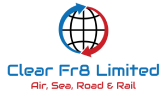UK T1 Transit documents
T1 transit documents available from our Dover office are a set of legal documents that are required for the transportation of goods across international borders. These documents are necessary for ensuring that the goods are transported legally and in compliance with customs regulations. Dover T1 transit documents are used for the transportation of goods that are not destined for the country of transit but are simply passing through it.
Clear Fr8 Limited in Dover are pleased to announce that we have obtained our 𝗔𝘂𝘁𝗵𝗼𝗿𝗶𝘀𝗲𝗱 𝗖𝗼𝗻𝘀𝗶𝗴𝗻𝗼𝗿 𝗦𝘁𝗮𝘁𝘂𝘀 allowing us to release T1 transit forms from our Dover office! Avoid the customs delays today!
The T1 transit document is issued by the customs authorities in the country of departure and must be presented to the customs authorities in the country of destination. The document contains information about the goods being transported, including their description, quantity, and value. It also contains information about the route the goods will take and the means of transport that will be used.
What is a T1 Document?
T1 transit documents are required for both road and rail transport and are used to ensure that goods are not subject to unnecessary delays or inspections at customs. They are also used to ensure that customs duties and taxes are paid correctly and that the goods are not subject to seizure or confiscation by customs authorities.
There are several types of T1 transit documents, including the T1 transit declaration, the T1 transit accompanying document, and the T1 transit guarantee. The T1 transit declaration is used to declare the goods being transported, while the T1 transit accompanying document is used to accompany the goods during transit. The T1 transit guarantee is used to guarantee payment of any customs duties and taxes that may be due on the goods.
Why do I require a T1 Document?
In conclusion, T1 transit documents are an essential part of the international transport of goods. They ensure that goods are transported legally and in compliance with customs regulations, and they help to prevent delays, inspections, and confiscation by customs authorities. Anyone involved in the international transport of goods should be familiar with T1 transit documents and should ensure that they are used correctly to avoid any problems or delays during transit.
Where Can I get a T1 from in the UK?
To get a T1 document, you would typically need to:
-
Register for the NCTS: Your company needs to be registered to use the NCTS. This involves getting an Economic Operators Registration and Identification (EORI) number if you don't already have one.
-
Submit a Transit Declaration: This is done through the NCTS. The declaration will include details about the goods, the route, the guarantee, and other relevant information.
-
Obtain a Guarantee: Transit movements usually require a financial guarantee to cover potential customs duties and other charges for the goods while they are in transit.
-
Get the Goods Released: Once the transit declaration is accepted, and the guarantee is in place, the goods can be moved. The T1 status of the goods is then 'active'.
-
Complete the Transit: When the goods arrive at the final destination, the T1 document must be presented to the local customs authorities. The authorities will then discharge the T1, meaning the transit movement is officially completed.
How does a T1 work?
-
Initiation of Transit Movement:
- The process begins when goods arrive at the EU border or are in an EU customs territory but haven't yet cleared customs.
- A T1 document is issued to allow the goods to move from the point of entry or current location to a specified customs office of destination within the EU or EFTA without paying customs duties at the point of entry.
-
Registration and Declaration:
- The sender (or a representative like a freight forwarder or customs agent) must register the movement on the New Computerised Transit System (NCTS), providing detailed information about the goods, their origin, destination, the route they will take, and the guarantee in place to cover potential customs duties.
-
Security and Guarantee:
- A financial guarantee is required to cover potential import duties and other charges that become due if the goods don't reach their intended destination within the EU or are otherwise mishandled.
- The guarantee ensures customs authorities can recover any potential duties or taxes if the transit procedure is not completed correctly.
-
Customs Control and Sealing:
- At the office of departure, customs officials may inspect the goods and then seal the transport unit (truck, container, etc.).
- The T1 document (or the corresponding reference number from the NCTS) accompanies the goods, and the transit movement is officially started in the NCTS.
-
Transit Movement:
- During transit, the goods must move directly to the specified destination following the declared route.
- The goods are under customs supervision but not subject to customs duties or VAT during this time.
-
Arrival and Discharge of the T1:
- Upon arrival at the destination office (the customs office of destination), the recipient presents the T1 document to the local customs.
- Customs authorities verify the goods and the accompanying documents. If everything is in order, they discharge the T1, meaning the transit procedure is completed.
- If the goods are to be imported into the EU at this point, customs duties and VAT are assessed and must be paid.
-
Irregularities and Penalties:
- If there are discrepancies (e.g., missing or damaged goods) or if the goods don't arrive within the specified time, the guarantee may be used to cover potential customs duties and penalties.
- The holder of the procedure (the person or company under whose name the transit declaration was made) is responsible for ensuring that the transit procedure is properly completed and may face penalties if irregularities are found.
DOCUMENT REQUIREMENTS
- Certificate of Origin
- Packing List
- Bill of lading
- Commercial Invoice
- Customs Clearance

